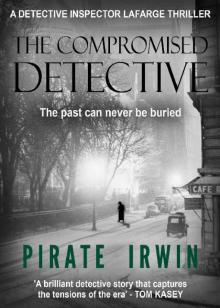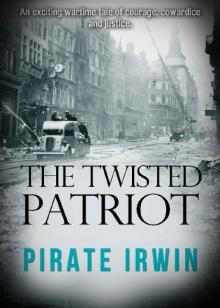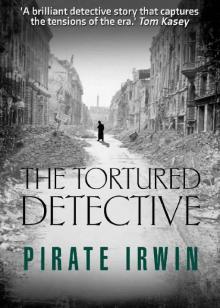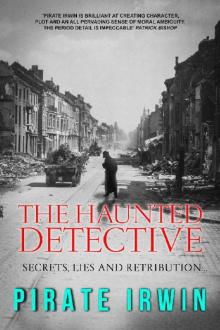- Home
- Pirate Irwin
The Twisted Patriot
The Twisted Patriot Read online
THE TWISTED PATRIOT
Pirate Irwin
© Pirate Irwin 2011
Pirate Irwin has asserted his rights under the Copyright, Design and Patents Act, 1988, to be identified as the author of this work.
First published in 2011 by Yehkri.com A.C.C. Publishing
This edition published in 2018 by Sharpe Books
To my beloved brother
Samson Fortune Irwin
Table of Contents
CHAPTER ONE
CHAPTER TWO
CHAPTER THREE
CHAPTER FOUR
CHAPTER FIVE
CHAPTER SIX
CHAPTER SEVEN
CHAPTER EIGHT
CHAPTER NINE
CHAPTER TEN
CHAPTER ELEVEN
CHAPTER TWELVE
CHAPTER THIRTEEN
PART TWO
CHAPTER FOURTEEN
CHAPTER FIFTEEN
CHAPTER SIXTEEN
CHAPTER SEVENTEEN
CHAPTER EIGHTEEN
CHAPTER NINETEEN
CHAPTER TWENTY
CHAPTER TWENTY-ONE
CHAPTER TWENTY-TWO
CHAPTER TWENTY-THREE
CHAPTER TWENTY-FOUR
CHAPTER TWENTY-FIVE
EPILOGUE
CHAPTER ONE
July 20, 1959
Sir Henry Culthorpe rarely liked disturbing the Prime Minister late at night, particularly as recent political difficulties had soured his temperament to such a degree that even those closest to him risked being sacked for the slightest indiscretion.
However, Culthorpe could not wait till morning to inform Harold Macmillan of the news that had just reached him via Justice Moffett – Sebastian Stuart, formerly Minister of State for Defence, had disappeared.
Usually to lose such a young rising star in a party that wasn’t exactly overflowing with them would be a serious body blow, but to Culthorpe it was the best news the Government had had in months and he was sure, as he was shown into the private drawing room at Number 10, Downing Street, Macmillan would share his point of view.
Culthorpe should ordinarily have informed his direct boss, Home Secretary Rab Butler of the news first, but Butler, as ever, was out of contact and no doubt passing the night away drinking and hatching another conspiracy with those fellow Conservative MPs who, like him, believed he was the Tories’ Messiah and had had the leadership stolen from him by Macmillan and the other High Tories.
Culthorpe had entertained ideas of running for office, but instead had opted to rejoin the Civil Service after having what could be termed a “good war” fighting in the Desert, and then in Burma under Field Marshal Slim with the 14th Army or the “Forgotten Army” as the veterans bitterly remarked on watching the less than endearing Field Marshal Montgomery take the plaudits for beating the Germans.
Culthorpe, never one for hiding his self-regard, felt he had become the “Forgotten Senior Civil Servant” under Butler, whose liberal beliefs failed to mirror his ultra-conservative outlook on life and he had found himself drawn to the less charismatic though infinitely wilier charms of Macmillan – he believed his attraction to “Mac” lay in their sharing Scottish roots.
Sir Henry, who had never put back on the weight he had lost in the jungle but termed himself in the good-looking if slightly grey class, had had doubts about Macmillan of late, as his judgement had gone a bit off target, but in his eyes he, Culthorpe, had nothing to lose as he was in a failsafe post on which he didn’t depend on the electorate – hence his decision to avoid telling Butler first and come to see the PM about Stuart.
As for Stuart, well, to Sir Henry’s high moral standards, he fell into an even lower category than Butler, but then again that wasn’t surprising, given the problems he had caused of late.
Sir Henry’s reverie about such problems was broken by Macmillan entering the room. He was looking his usual hangdog self and judging by the expression on his face he didn’t look too happy at being roused out of his bed, having been sound asleep.
The Prime Minister’s ruffled grey hair and half-opened eyes – accentuated by the huge bags under his eyes which his opponents drily commented could store his clothes when he travelled abroad – compared unfavourably with the elegance of the room which his wife had introduced since he had become the latest carrier of the flickering Tory Torch.
Macmillan, who never looked happy at the best of times and these days were hardly those, helped himself and Culthorpe to a Single Malt Scotch in fine crystal tumblers but registered his impatience with this unwelcome intrusion at two in the morning by going over to the fireplace and tapping his fingers on the marble surface.
“Culthorpe, what’s so damned important that you get me out of bed at this hour. It’s another bloody coup against me by Rab and his gang, isn’t it?” Macmillan mumbled resignedly at Culthorpe. “You know perfectly well that at the moment I am having trouble sleeping and I need to be fresh in the morning to face Butler and this is not the best time for me to plan a counter-attack,” he reproached Culthorpe.
Culthorpe, who in that time-honoured fashion of civil servants had switched from unswerving loyalty to Macmillan’s predecessor, Sir Anthony Eden, to the bedraggled, sorry-looking figure standing in front of him, sighed and waited for the Prime Ministerial squall to die down.
“You can rest easy on that count, Prime Minister. No, I’ve come round at this admittedly inconvenient hour because there’s been a death in the family, so to speak,” he said, and smiled, rather proud at the use of the term.
“Not Rab, I suppose,” Macmillan ventured optimistically.
“No, Prime Minister, but you will probably find it just as palatable when I tell you that the problem over Stuart’s determination to stay on as an MP seems to have been resolved, as he has disappeared.”
To Culthorpe’s astonishment, Macmillan didn’t appear to have registered what he had just said – perhaps the mix of the sleeping pills “Mac” was rumoured to be taking and the whisky had dulled his senses – and without the slightest show of emotion the Prime Minister shuffled over to the drinks cabinet and poured himself another drink.
However, as if to demonstrate Culthorpe had now got his undivided attention, Macmillan settled slowly into his favoured leather armchair, stretched out his blue and red striped pyjama-clad legs and rubbed his eyes which to his unobservant companion looked like ridding himself of some sleep but in fact were tears.
“How did it happen?” Macmillan asked in a quivering tone, which took Culthorpe rather by surprise.
“What, the disappearance? That I have no inkling of, save he was dropped off at his house by his chauffeur and has not been seen since. But if you are asking how this sorry mess came about, well, it lies fairly and squarely with Stuart and I won’t be crying if he is never found because of the ill he has caused you and the party,” Culthorpe said.
Macmillan eyed Culthorpe and thought, what had it come to when he relied on humourless puritans like him for support and information and all the witty risk-takers were ranged against him – worst of all, although he could never admit it publicly, he had been rather fond of Stuart, despite his disgrace.
However, whether it was one Scotch too many or his personal dislike of Culthorpe, who was so thick-skinned that he did not register Mac’s cool feelings towards him, he decided to air his feelings.
“Well, while on a political level it may be good news, on a human level I find it rather sad. He was amusing, brave and a gambler for very high stakes and one has to admire him for that because there are few of that sort left,” Macmillan said.
For once, Culthorpe’s self-assurance was stripped away from him by this most unpredicted reaction. It left him not only feeling personally deflated at no
t having received a warmer reaction to his news but also irritated. For a rare moment he threw off his usually repressed and restrained temperament he had inherited from his authoritarian Scottish Presbyterian mother.
“If you will forgive me, Prime Minister, I don’t share your rather rosy view of Stuart and I think you would be well advised to keep those opinions to yourself if you are not to suffer any more political fallout from the whole sorry and tawdry affair,” Culthorpe thundered.
“Will that be all, Sir Henry?” and while it was a question, it was clear Macmillan meant it in the rhetorical sense.
Culthorpe, embarrassed at his most unwelcome loss of Scottish sangfroid, nodded, rose from his chair and, twiddling rather nervously at his well-waxed greying moustache, walked to the door and laid one of his rather feminine and finely manicured hands on the door handle when Macmillan, who had remained seated, broke the frosty silence.
“Oh, Culthorpe, one last thing before we lay this matter to rest, apart from the fact we both acknowledge that what I say remains between us.”
Culthorpe, who would have gladly run off and told Butler everything, if only for the fact he disliked him so much, groaned inwardly at what new eulogy Macmillan was going to come forth with about damn Stuart.
“For all his faults, Stuart was a patriot . . . A twisted one, perhaps, but nevertheless a patriot.”
Culthorpe, who had had his fill of traitors and spies being unmasked at regular intervals over the years, was mortified.
However, having broken protocol by not informing Butler first, he was now more concerned than ever to preserve his business-like relationship with the Prime Minister. Despite having ever increasing doubts about his sanity and judgement, Culthorpe was in no mood to cause offence again on what had been a thoroughly unsatisfactory meeting for him.
“A twisted patriot. Mmm, that has a nice ring to it, Prime Minister.”
Without further ado, Culthorpe, who measured his disappointment by the fact that for the first time in a very long while he was actually looking forward to going home to the empty house in Pimlico, which had been the case since his dear wife Francine had died six months ago, bid Macmillan goodnight. The increasingly beleaguered Prime Minister stared into the unlit fireplace, contemplating how he would react to the press in the morning over Stuart’s convenient disappearance and those within the party who would criticize him for staying too loyal to the disgraced minister.
June 21, 1959
Culthorpe would have had a much better reception a few weeks before if Sir Adam Steiner QC had been the receiver of his news.
As it was, Steiner entered his Chambers at Middle Temple in far better spirits than anyone had seen in months, not least his clerk William Ellison, who on account of his master’s foul temper had been thinking about leaving his lucrative but joyless post despite having been with England’s foremost criminal lawyer for eight years in which both had got considerably richer.
Steiner, who was not in the least bit clubbable and used his sardonic wit not only to destroy witnesses but also his peers and fellow barristers both inside and outside the court room, tried hard to repress his joy at the delivery of the verdict on Stuart.
“Good morning, Ellison. Fine day, isn’t it?” smiled Steiner as he proceeded briskly past his clerk and into his huge opulently decorated office.
Ellison, who knew from the other clerks that Steiner’s taste in decoration was the laughing stock of his more conservative fellow barristers, particularly his mixing shocking pink curtains with expensive soberly coloured Persian rugs, followed his most demanding master into the office with a whole set of new briefs.
“So, apart from what should be a cursory appearance in court for the verdict, what have you got for me today then, Ellison, looks like a pretty full one to me . . . I mean, a pretty full pair of briefs and I hope they are clean!” Steiner chuckled heartily at his joke and Ellison too found it rather amusing, although he had been previously unaware of Sir Adam possessing such lewd humour.
“Yes, Sir Adam, aside from the Stuart verdict there are plenty of briefs, and they are pretty interesting ones too, though you may not get through them today as you no doubt will be celebrating,” Ellison said.
“Ah yes, of course. All right, Ellison, leave them with me and use your customary discretion with any phone calls, apart from Lady Steiner, whose calls I will take,” smiled Steiner.
Ellison, whose formerly athletic body which had carried him through six years’ fighting with the Grenadier Guards in the Second World War had now developed into a rotund frame topped by a round red face, reflecting the long hours he put in in the pubs after work drinking with his fellow clerks, mistook Steiner’s rediscovered good humour and wondered whether he should stop this renaissance in its tracks just in case the verdict went against him.
However the evidence suggested that Stuart had little chance of escaping a guilty verdict.
Ellison, though, not being the type to hold his tongue when there was fresh news or gossip to be spread, decided to bite the bullet.
“It could be tough news for Mr Stuart, Sir Adam?” Ellison ventured.
Steiner, who would have willingly jumped for joy in anticipation of the denouement, steeled himself, ran a thin birdlike hand through his mass of dark straight hair and stood there silent for a moment.
“Yes, it will be dreadful, Ellison,” he sighed – he restrained himself from one of his sardonic chuckles, judging that would be a bit over the top and while Ellison was not the brightest he was certainly more perceptive than the average juror and would wonder why this case above all others had been so personal.
“He is young and, knowing him, would have been capable of returning to the top. He is like, even though it might sound inappropriate, given his war record, the Russians in the War. He never knew when he was beaten and refused to give up,” Steiner said.
Ellison, nursing a humdinger of a hangover after another night of swapping tales with the other clerks which had landed him in trouble once he returned home to his long-suffering wife, Rosemary, evidently had something on his mind and, rather than let it fester all day when there were more important matters to deal with, Steiner nodded at him to get it off his chest.
“It may well be none of my business, Sir Adam, but it seems strange such a good-looking and successful man as Mr Stuart should never have married,” Ellison said, but immediately regretted opening his mouth and began staring sheepishly at the floor.
“And what’s that supposed to infer, Ellison?” Steiner asked resignedly, wishing he hadn’t got involved after all in the inner workings of Ellison’s inquest into Sebastian Stuart’s private life, which from time in memoriam had been complex enough for those who knew him.
“Well, having heard all that stuff in court recently and knowing some of the company he kept, sir, well, what I mean is, was he one of those, like, was he a homosexual, even if he did have that affair with the German woman?”
Steiner, who had wondered about that when they had been at university together but had quickly been disabused of that notion, laughed and, while it wasn’t totally at Ellison’s expense, the poor clerk thought it was and his red face ascended one notch on that scale to scarlet.
“No, he wasn’t a homosexual. It’s just responsibility and taking care of anyone but himself was never his forte,” replied Steiner, who by this stage had turned his back on Ellison and was staring out past his pink curtains.
He thought of Mirabelle his wife, not as she was now, but of the girl he had known 20 years ago – and when he could truly declare Sebastian Stuart was his best friend.
CHAPTER TWO
1938 – Oxford University
“Christ, the boat’s overturned!” yelled John Stone, the Master of New College. Stone, who had been cycling along the pathway watching his crew try and inch their way up the standings in the traditional summer mayhem of the college rowing bumping competition in which each crew tried to catch the other up and register a bump on the boat in front of
them, had watched horrified as his boys’ boat had gone belly up in the raging torrent of the Isis.
While Stone, who at 65 was not exactly up to the job of diving in and rescuing his students, stood aghast at the potential tragedy unfolding in front of him along with the rest of the spectators – predominantly young male students dressed in predominantly tweed jackets and corduroys, mixed with a few girls who had come along as interested observers of what was regarded as something akin to the Charge of the Light Brigade on water.
However, happily several of the crew reappeared on the surface and started swimming to the riverbanks.
One by one they somehow made it to the safety of the muddy but solid ground with the exception of one boy.
“Steiner is missing!” Adrian Murray, the cox, cried out.
“Did anyone see him on the way in?” Stone enquired, thinking of the dreadful moment he would have to contact his parents with the news if he didn’t reappear.
However, his question was met with silence as the soaked remaining members of the crew lay gasping for breath and in shock on the grass surrounding the pathway.
Stone, who had witnessed enough misery close-up during the First World War losing two brothers and then every single member of his platoon when they walked mistakenly into a minefield he had been told had been cleared – or at least, that’s what he told himself when he had soused himself with drink almost every night since the tragedy – stared disconsolately into the river, hoping upon hope Steiner would appear.
Suddenly there was a splash to his left and turning in the expectation of seeing Steiner, a boy whom he felt he had brought along really well after a shaky start to his career at a college which did not suffer those it felt were not old money gladly, saw instead a figure swimming out to the middle of the river.
“Good God, which bloody fool is that!” Stone shouted.
“It’s Sebastian Stuart, sir,” replied one of the spectators.

 The Compromised Detective
The Compromised Detective The Twisted Patriot
The Twisted Patriot The Tortured Detective
The Tortured Detective The Haunted Detective
The Haunted Detective